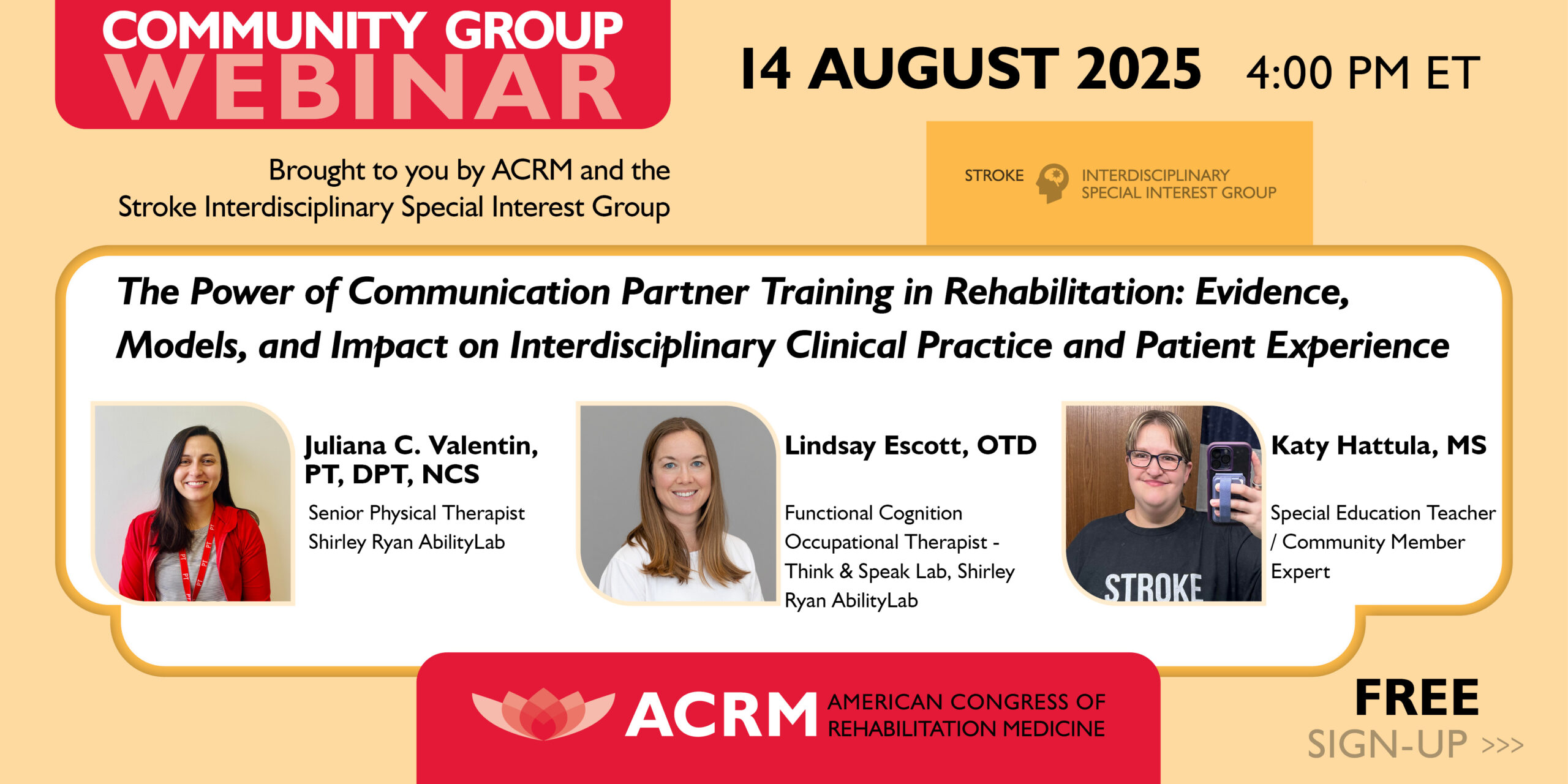STROKE ISIG Virtual Happy Hour
It’s fun, it’s informative — Join us!
Virtual Happy Hours are webinars featuring expert speakers in all areas of stroke rehabilitation. This is an opportunity to learn from and interact with the best in our field!
UPCOMING VIRTUAL HAPPY HOUR
14 AUGUST // 4:00 PM ET
The Power of Communication Partner Training in Rehabilitation: Evidence, Models, and Impact on Interdisciplinary Clinical Practice and Patient Experience
With guest speakers, Juliana C. Valentin, PT, DPT, NCS, Lindsay Escott, OTD, Katy Hattula, MS
Moderated by Elissa Larkin, MS, CCC-SLP, HEC-C
Many patients across rehabilitation settings have diagnoses that affect their speech, language, hearing, cognition, and/or voice, and therefore their ability to understand and be understood by others. Accurate information exchange is critical for optimizing rehabilitation outcomes and ensuring equitable care, and the provision of communication accommodations for patients who need them is included in best practice standards (e.g., The Joint Commission, 2010). Therefore, providers must be empowered with the knowledge and skills to meet their patients’ communication needs. Communication partner training (CPT) is an evidence-based approach to teaching communication accommodation skills and has been shown to be effective for varied interdisciplinary healthcare professional trainees (Cruice et al., 2018).
This panel includes a Speech-Language Pathologist and CPT facilitator, an Occupational Therapist and Physical Therapist CPT trainees, and a community member expert with lived experience of accessing healthcare with a communication disability. The CPT facilitator will describe evidence-based CPT components, training models, and implementation considerations for practicing rehabilitation clinicians. Clinician trainees will share their reflections on how CPT has impacted their clinical practice and patient and family interactions, and a person who is a stroke survivor living with aphasia will compare her experiences with clinicians who did and did not know how to accommodate her communication needs during clinical care. Finally, the panel will invite the audience to engage in collaborative discussion about CPT, and how rehabilitation clinicians and researchers can increase our ability to more effectively accommodate our patients’ communication needs.
LEARNING OBJECTIVES
Upon completion of the webinar, learners will be able to:
- Define Communication Partner Training (CPT) within the context of interdisciplinary clinical education.
- Summarize current best practice evidence related to CPT and implementation considerations in rehabilitation settings.
- Describe examples of CPT impact on interdisciplinary clinical practice and patient experience.
PAST WEBINARS
- Meeting people with stroke where they are: Virtual and technology-based practice
With guest speaker, Tim Dionne, PhD, OTR/L - It Takes All of Us: The Role of Rehabilitation Professionals in Supporting Mental Health in Patients with Aphasia
With guest speaker, Katie Strong, Ph.D., CCC-SLP - Introduction to AAC and Aphasia for the Rehabilitation Professional
With guest speakers, Sarah E. Wallace, PhD, CCC-SLP, ASHA Fellow and Elena Donoso Brown, PhD, OTR/L - Discharge Planning for People With Aphasia Post Stroke: The LEAVING Checklist
With guest speaker, Deborah Hersh, PhD, FSPA, CPSP
The webinar will discuss how to best support the needs of people with aphasia upon discharge. - Creating a Telehealth Program in Metropolitan and Rural Environments while Responding to a Pandemic: The Lessons Learned
With guest speakers Brian Hull, PT, DPT, MBA and Bryan Kolberg, PsyD, ABPP
This webinar will continue the discussion on maximizing benefits of telehealth as a viable medium. Participants can expect to learn the essential steps of creating a telehealth program and how to apply lessons learned during the pandemic to future practice. - Addressing the Needs of Individuals with Stroke during the Transition from Hospital to Home through Problem-Solving Training
With guest speaker, Candice L. Osborne, PhD, MPH, OTR
Dr. Osborne will discuss the needs of patients with stroke, the supports currently available, and introduce participants to Problem-Solving Training. She will discuss the evidence supporting the use of Problem-Solving Training and how it can be used clinically, and share the results of a pilot study of early Problem-Solving Training for patients with stroke. - Disparities in Stroke Outcomes: Looking Upstream and Downstream for Solutions
With guest speaker, Charles Ellis Jr., PhD, CCC-SLP
This webinar will examine the known contributors to disparities in stroke outcomes, including social determinants of health. - Health Promoting Behaviors that Improve Quality of Life for Individuals Post-Stroke
with Leanna W. Katz, MS, OTD, OTR/L
This webinar discusses the social, emotional, and physical components impacting health outcomes and quality of life and how to apply a strengths-based approach to support health-promoting behaviors post-stroke. - Language Intervention in Multilingual Speakers with Aphasia
with Mira Goral, PhD, CCC-SLP - Just the Way You Are: Intimacy & Sex After Stroke
with Alexandra L. Terrill, PhD and Paige Salinas, LCSW, CBIS
Presenters discuss issues pertinent to intimacy and sexuality after a stroke with a focus on strategies for addressing these concerns that are important in the recovery of the stroke survivor. - A Paradigm Shift: Rehabilitation Robotics, Cognitive Skills Training and Transfer to Function
with Susan Fasoli, ScD OTR/L - Cannabinoids for Neurologic Conditions
with Natalie Schmitz, MPA, PharmD, PhD - Optimizing Intensity in Aphasia Rehabilitation
with Swathi Kiran, PhD, CCC-SLP - Addressing Return to Work after Stroke: The Practice Patterns of Occupational Therapy Practitioners and Implications for Inter-disciplinary Practice
with Shannon L. Scott, OTD, OTR/L - Practical Treatment Approaches for Double Vision in Acquired Brain Injury: Emphasis on Cranial
with Amy Berryman, OTR, MSHSA
CONNECT WITH ACRM
Follow the Stroke ISIG on Twitter @ACRMStroke for more details and reminders about this exciting event!













